Depending on how you count it, Seth Littrell has waited either eight months, 15 seasons or 25 years for this day. He accepted the head coaching job at North Texas eight months ago. He jumped into coaching 15 seasons ago, as a graduate assistant at Kansas. He caught the coaching bug 25 years ago, as an eager 6th grader who tagged along with his Little League football coaches to scout their opponents. Either way, each of those timelines have folded together, converging on today -- his first day of his first training camp as a head football coach.
Littrell left his job as North Carolina's offensive coordinator to become the North Texas head coach in December. He's been through recruiting and spring ball and the spring evaluation period and summer conditioning. But today, Monday, is his first on the field, directly building toward what will take the field September 3 against SMU.
FootballScoop was embedded with Littrell from the time he arrived in the morning through his departure at night, and in every meeting in between. This is what we saw.
8:03 a.m.: Littrell arrives to his reserved spot -- right next to the AD's, which will sit empty until Wren Baker's arrival two weeks from now -- in a Lexus sedan. (I'll admit it, I expected a truck.) The sun has climbed over the Mean Green's athletics headquarters. Summer school is still in session, which means while other teams have plunged head first into training camp by now, North Texas eases its foot into the pool. Littrell greets a couple players sitting on a bench outside the building's entrance; he immediately reminds them to hydrate. He climbs the winding stairs to the second floor offices and pours himself a generous portion of coffee into a styrofoam cup, then greets a group of assistants gathered in the staff room next to his office. "Our staff environment is unbelievable," he tells me. "These guys check their egos at the door every day."
8:28: The scheduled 8:30 staff meeting begins two minutes early. Defensive coordinator Mike Ekeler sits to Littrell's right, offensive coordinator Graham Harrell to his left. Littrell begins by reminding his staff to make sure they're constantly harping on players to hydrate. "Force them to carry a water bottle," he says. "Last year at North Carolina we didn't have any cramping, any hydration issues. There's a reason 80 percent of injuries start in preseason camp. One, they give us 29 practices in 30 days, which isn't smart. Two, hydration and lack of sleep." His staff calls him 'sir,' which Littrell says later he didn't mandate but doesn't mind. As his assistants share their plans for this afternoon's practice, Littrell bounces his legs on the carpet. Constantly.
8:42: Special teams coordinator Tommy Perry leads the staff through the X's & O's of the punt coverage he'll teach at today's practice. "I want coaches working on technique," he says. "If you don't want to bang your arms up, that's fine. We can get you arm pads. Or we can get managers." Littrell adds, "We'll win games in this area. We've got to make it our edge. Everybody knows every game is going to be a dogfight. We're not going to be blowing people out."
9:00: The staff meeting ends at 9 o'clock on the dot, when the defensive staff leaves for their own meeting and the offensive staff remains. Ekeler pokes his head back in to speak with offensive line coach Brad Davis. Ekeler's group will work solely on fit this afternoon. "If y'all want to run for 20,000 yards on us today, I don't care." Davis deadpans, "I'd be happy to catch the snap today."
9:23: The rest of the staff leaves the room except Littrell, Harrell and offensive GA John David Baker. Littrell and Harrell are of different branches of the Mike Leach Passing Tree. Littrell learned the system as a player at Oklahoma and as Leach's running backs coach at Texas Tech. Harrell played quarterback at Texas Tech (the two shared four years together in Lubbock), then jumped into coaching under Leach at Washington State after his journeyman professional career closed. The two spend 45 minutes melding the different mutations of Leach's Air Raid system they've picked up through their separate travels -- Harrell references plays he learned as a back-up with the Green Bay Packers often. It sounds like the meshing of two dialects of the same language.
Littrell: "I always liked tempo boots, tempo screens and tempo go screens."
Harrell: "Like... foxes?"
10:11: Littrell pours himself a second large cup of coffee, then returns to his desk. His office is spacious but not gaudy. His desk is mostly cleared, with a candle in a green vase on the corner to his left. He places his uncased iPhone with a cracked screen -- Littrell can't remember how it first cracked, but knows it became worse while riding go karts during a team outing to Malibu Speed Zone last night -- to his right. His computer sits on a hutch behind him, staged with six of the Mean Green's primary and alternate helmets. He has a private restroom and a door to the staff meeting room to his right, and a porch with a clear view of Apogee Stadium to his left. To the front of his office sits a white leather couch, two green cloth chairs and a mostly empty jar of green M&M's on the entry table, below a TV mounted to the wall.
With no film to review, the two of us talk. I'm mostly curious about the daily life of a head coach, the portion that fills in the margins around the job. Littrell says he moved his family from Chapel Hill to Denton immediately after taking the job. The four of them -- he and his wife Becca have two young children, a boy and a girl -- lived in an extended stay hotel for three months until they found a house, which he says was great for family bonding.
Littrell is also a NASCAR fanatic. (Jimmie Johnson is his guy.) He watches every race he can, and attended the Duck Commander 500 at Texas Motor Speedway in April. During the season he watches races on DVR when he gets home from work - the first half on Sunday night, the second on Monday night. Those who know him know not to spoil the ending.
11:31: Wren Baker calls. It's the only time all day I'll be asked to leave.
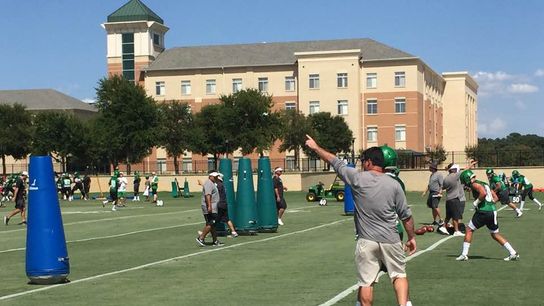
1:09 p.m.: Camp is unofficially, officially underway. Littrell walks into UNT's first team meeting with his arms out, talking crap with a group of players in the front row of the Mean Green's freshly-renovated team room. The smell of dry wall and fresh paint floats in from the hallway, a metaphor for the state of North Texas football as a whole. Against the wall are two projector screens showing the team's seating assignments; the defense is on Littrell's left, the offense on the right.
Before the football portion of the meeting begins, DFO Shane Elder introduces a parade of different departments the players will deal without throughout the year: academics support, staff from the equipment and training rooms, compliance, campus police. An academics advisor, in the midst of talking about his own department, unknowingly draws a metaphor for the entire program. "This is change," he says to a round of applause, "and change is good." Littrell occupies a chair in the front row. His feet never stop moving.
Strength coach Zack Womack follows. He wears his shirt tucked into his gym shorts, a tight buzz cut and a blasts a voice that could easily win him a role in a community theater remake of Full Metal Jacket. "I have three rules: No sittin', no quittin', and no bullshittin'! And no ear rings, no nose rings or whatever else shit you like to wear." Womack informs the team their first two practices will be followed by four rounds of 25 up-downs and two down-and-back gassers because two players skipped a summer workout. Littrell backs him up by addressing the offenders in front of the entire room, which is filled with only football personnel by now. "You are selfish," he says to one. "You want to be a leader, you're not even a good teammate. You think other guys didn't want to leave and drink beer? No, but they were here that morning. Maybe they'll build trust up with you, but you'll damn sure have to with me. That's 1-11 crap. I'm not going 1-11."
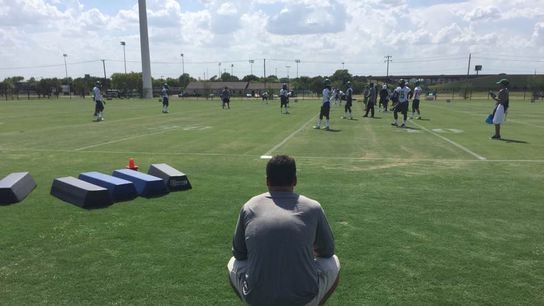
2:10: The team meeting has ceded to a special teams only meeting. Littrell stays. He drinks a water spiked with energy powder. "It'll make your hair stand up," he tells me. Perry leads the group through the punt coverage scheme they'll practice later this afternoon, booming a voice that would fill a room three times this size. Eventually, Perry is engrossed in illustrating technique to shield blockers, with an image of a cliff built into his PowerPoint slide. "Two minutes," Littrell pipes in. "Wow," Perry says to himself. He has enough material to fill three times' his allotted slot.
2:33: Practice starts in a little over half an hour. Littrell can feel the pre-practice energy. Or maybe it's the powder. He meets briefly with Elder.
2:34: He pops in a quarterbacks meeting with Harrell, in the staff room next to his office. "Who are gonna be the last guys lined up? Who do you have to be aware of?" Littrell asks the room. "Running backs," Harrell answers. "And outside receivers," Littrell adds.
2:37: Back in his office, Littrell reviews four new practice shirts and shorts provided by an equipment staffer. He approves.
2:43: Littrell pops in the weight room for a conversation with Womack.
2:45: Littrell pays a quick visit to the training room.
2:46: Littrell is back in the team meeting room, observing Ekeler lead the linebackers through a demonstration on shedding blockers. Littrell takes a seat, then leans forward on the chair in front of him. The players are in their stances, legs quivering by now. "How do you read run/pass?" Ekeler asks. "You feel the damn thing. Can Ray Charles read run/pass? You're damn right!"
Ekeler is an engaging, active teacher. Every student in his class can be called on to answer a question at any time. Most of them have answers prepared. Ekeler follows almost every answer with "hell yes" or "hell no."
2:59: Littrell checks the time on his phone. Ekeler senses the clock. It's time to hit the field.
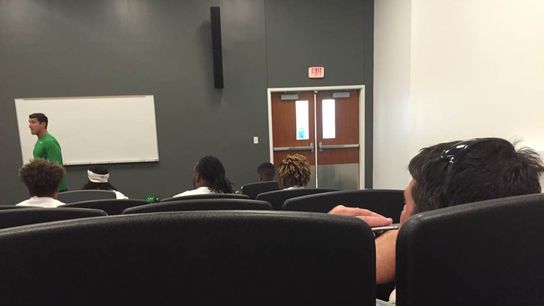
3:02: In the unfinished hallway, Littrell stops to shake hands with construction crew who have come to check on the project's progress.
3:04: Littrell hits the field, and is immediately mic'd up for Mean Green-focused TV show. "You don't strike me as a screaming type," an associate producer tells him as he checks levels on the microphone clipped to Littrell's shirt. "I'm not," he says. "It's a waste of time."
3:13: Speaking of wasting time, Littrell has figured out how not to do that in his practices. There's hardly anyone in a helmet not doing something at every moment of practice. While each of his assistants shouts instructions loud enough to overpower the rap music and reach the free space between the offensive and defensive fields, Littrell is mostly quiet. When he does say something, it's to one player at a time, often with a hand on the player's shoulder pad.
3:24: The buzzer sounds, signaling a massive movement of bodies. It's the first punt period of the day. "Don't start it until they get here," Littrell barks to the GA holding the buzzer.
4:09: Littrell jumps in a play as a scout team linebacker here and stands over a center there, but mostly he watches and observes.
4:39: "THERMAL ASSAULT! Let's go!" For the next five minutes, players are required to sit -- on aluminum benches or, when those are taken, the grass -- under a tent and consume blue Powerade for the next five minutes. At one point, Littrell emerges from the tent to chase a pair of idle water boys into the tent.
5:23: The only time Littrell can be heard from the sideline. His neck expands, and his jawline forms a perfect 90-degree angle. "Let's go up front!" he barks to the offensive line.
5:36: "Everybody up!" Practice is over. "Don't feel sorry for yourself. People don't care. Don't allow that to creep into your mind and make it an excuse. We don't talk about the weather. Make it your advantage," he says. My phone tells me it's 99 degrees, a tick or two cooler than a typical August afternoon in north Texas. "Put fluids in your body. You ought to have a bottle with you from now until next practice. Eat right. And you better get eight hours' sleep."
It's at this point Littrell would have dismissed the players to the bank of waiting cold tubs in the bowels of Apogee Stadium, but a pressing matter awaits. "I wish we could be inside," he says. "We're done. But we hold each other accountable. It's your job to hold each other accountable, and it's my job to hold you accountable."
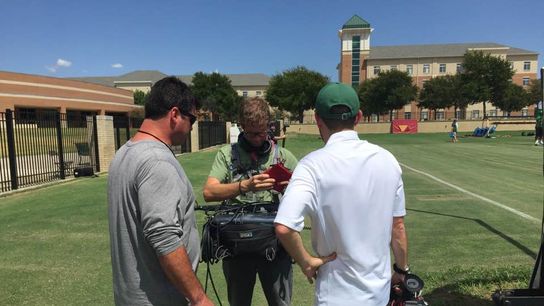
5:39: The team spreads out across the entire far sideline of the offensive field. Skill players are on the right, linebackers and quarterbacks in the center, offensive and defensive lines on the right. Womack leads the team through their accountability session, while each coach stands before his position group. Littrell stands in front of the offensive line, arms crossed.
By the third set of up-downs, the skill players are still conditioned enough to get in a few chops of their feet in between tweets of Womack's whistle. It cascades from there. The offensive line is doing glorified push-ups. "This is like Hard Knocks U.," an offensive lineman says to no one in particular.
5:59: Conditioning is over. "Don't ever miss one of my workouts," Littrell says with a smile as he walks by a recruit.
6:00: "DADDY'S HERE!," a small voice shouts. Littrell's wife and kids arrived to watch the last half of practice, sitting in the shade under one of the video towers. His daughter bunny hops over a set of bags to her parents' approval.
6:31: After dinner with his family in the cafeteria, it's time to review the film. Like practice, his assistants pepper comments to each other while Littrell watches and listens. Harrell controls the clicker.
6:35: Littrell leans forward, bouncing his feet on the carpet. The staff, Littrell included, tosses stray observations into the air. I feel like a Spanish 2 graduate dropped on a Mexico City street corner.
"Can't run slice there. It's unprotected. Gotta run bang."
"I didn't ever run unprotected because people aren't squeezing anymore."
"When you're against the boundary, he's got to be your Sam because he's going to turn that loose."
"He's got to know that's a flat defender."
"Is he tagging Omaha down here?"
7:07: It's a typical first practice -- the effort is there, the execution isn't. After 30-plus minutes of film, the mood in the room softens. After one particularly Yakety Sax play, Littrell wraps his towel around his head, places his elbows on the table. "I should've been a farmer," he says.
7:19: Elder pops his head in to tell Littrell some player are still eating dinner after an extended post-practice recovery session. "We can't keep them out there from 2:30 to 6 tomorrow. That's too long," Littrell says, signaling he may want to punt on tomorrow's scheduled post-practice conditioning.
7:34: The whole group has assembled in the team room, players back in their assigned seats. "It's a good start, but every day has to be better," Littrell tells them. He warns them to fight through tomorrow's fatigue to keep the intensity high, then urges new leaders to step forward. On a team rebounding from a 1-11 season and with 52 newcomers on the roster, new faces stepping forward is a must.
"Today pissed me off," Littrell says. "We had to put extra strain on your bodies, we had to keep you here later, because some of you decided to be selfish. If anyone knew they were going to leave and allowed it to happen, it's just as much your fault as it is theirs. Depending on how we do tomorrow will determine how we finish practice. This team still owes me one. Either you'll pay me on the field or we'll do it again."
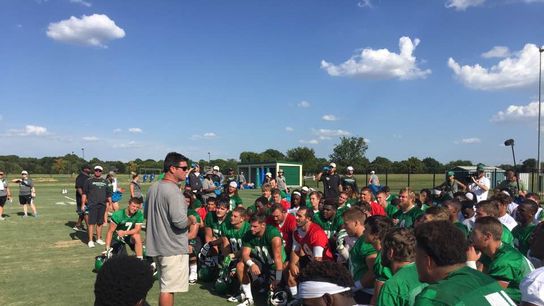
7:44: The team meeting ends with a video of running back Jeffrey Wilson and linebacker Fred Scott performing a lip synced version of Justin Bieber's "Sorry" from Conference USA media days. The team howls in approval.
7:57: Littrell sticks around for the special teams meeting. He interjects with instruction for the punt team's offensive linemen to keep their weight in the balls of their feet. "You running backs know exactly what I'm talking about," he says.
8:18: After a round of checking in on other position groups, Littrell returns to the team room to watch Ekeler's meeting with the linebackers. The focus is on how to read a two-back formation. "Train your eyes while you're watching film," Ekeler says. "If you don't do it the right way you might as well be watching cartoons."
9:02: Littrell visits with head athletic trainer Dustin Hill. He receives the day's report while strumming an acoustic guitar on Hill's office couch. Olympic swimming plays on the TV to his right.
9:18: Littrell heads to the staff locker room for a post-practice shower. He passes a group of players on his way from the training room to the coaches' office. "Eight hours," he tells them. "Eight hours." One confesses a desire for 12.
9:39: Out of the shower, Littrell dons his third outfit of the day. He visits Elder to tie loose ends on the first day of camp.
10:04: Back in his office, night has cascaded upon his view of Apogee. Someone has filled the jar of green M&M's. Littrell leafs through papers on his desk and checks his phone. He heads out of the offices and down the stairs. For all the emphasis on his players' sleep, Littrell says he rarely gets more than five or six hours a night. The mind never stops churning on football, especially at this time of year. After all, Day 2 is just hours away.